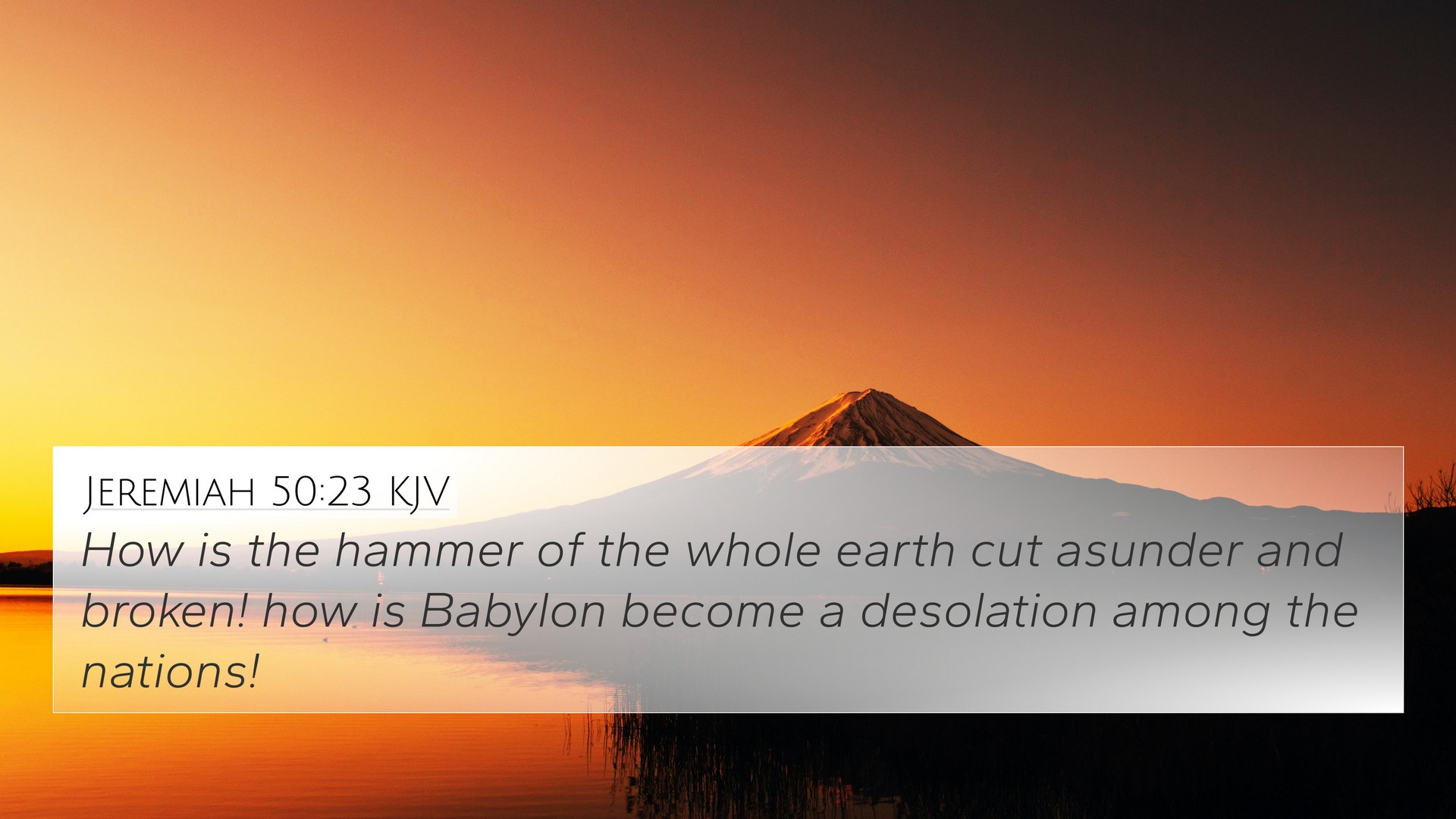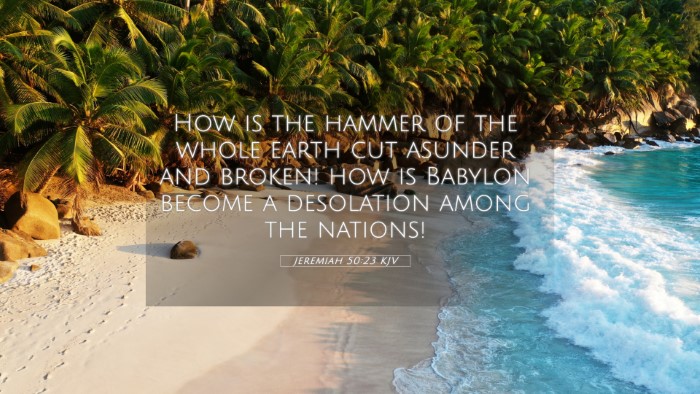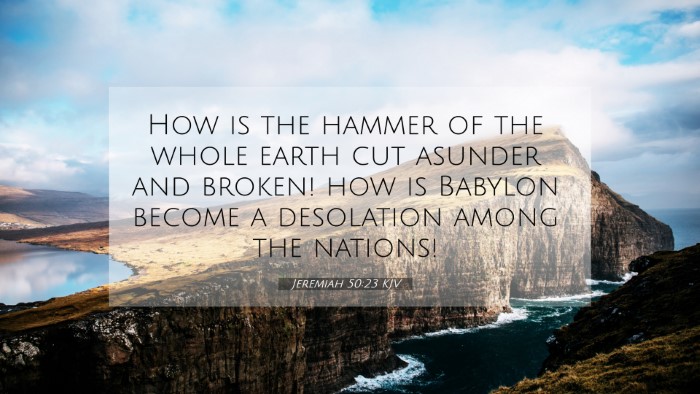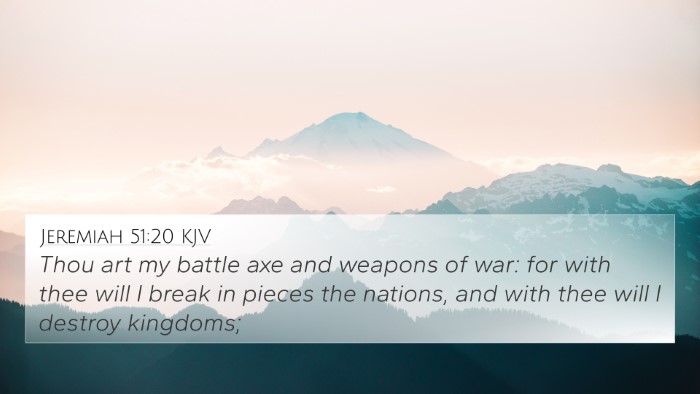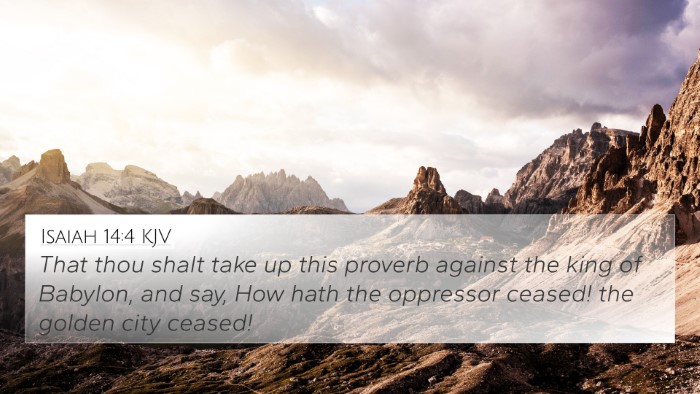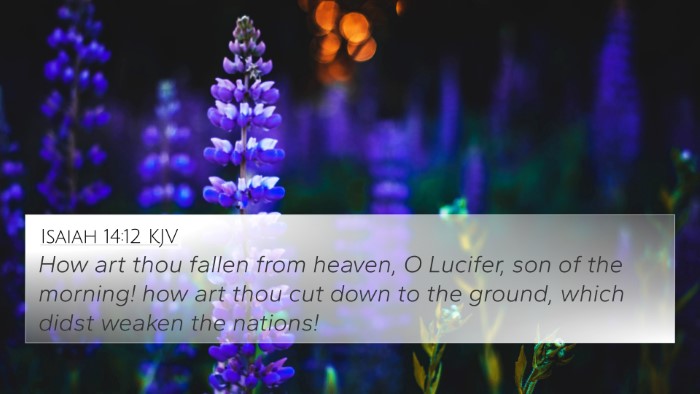Understanding Jeremiah 50:23
The verse Jeremiah 50:23 states: "How is the hammer of the whole earth cut asunder and broken! how is Babylon become a desolation among the nations!" This passage serves as a profound declaration of judgment against Babylon, symbolizing a significant shift in how nations perceive power and strength.
This summary combines insights from esteemed public domain commentaries, such as those by Matthew Henry, Albert Barnes, and Adam Clarke.
Verse Meaning and Context
The context of Jeremiah 50:23 pertains to the impending destruction of Babylon, a kingdom that represents oppression and pride against God.
- Matthew Henry: He emphasizes that Babylon was once powerful, like a "hammer" used to crush nations, but will ultimately face divine judgment. This serves as a warning to all proud nations that rely on their strength rather than God.
- Albert Barnes: Barnes interprets the term "hammer" as a metaphor for Babylon’s power in war and subjugation, emphasizing that even the mightiest can fall. He denotes that the prophecy illustrates not just the downfall of Babylon, but the broader theme of God's sovereignty over human pride.
- Adam Clarke: Clarke adds insight to the imagery, linking Babylon’s destruction as part of God’s plan to bring justice to His people. He sees this verse as part of a vision that aims to restore Israel and highlight the futility of trusting in human strength.
Thematic Connections
This verse has invaluable connections to various themes found throughout scripture, especially concerning judgment, pride, and divine justice. Below are significant cross-references related to Jeremiah 50:23:
- Isaiah 14:4-23: Reflects on the fall of Babylon, drawing parallels with pride and its consequent downfall.
- Revelation 18:2: Describes the fall of Babylon the Great, which symbolizes corrupt and ungodly power.
- Jeremiah 51:20-24: Further elaborates on how Babylon has been a tool for God’s judgment against nations and will face its own judgment.
- Ezekiel 26:20: Discusses the destruction of Tyre, mirroring the prophetic tone regarding Babylon's fall.
- Lamentations 2:15: Points to mockery of Zion, linking the theme of national pride leading to downfall.
- Daniel 2:34-35: In the dream of Nebuchadnezzar, it illustrates the fall of earthly kingdoms before God's everlasting kingdom.
- Proverbs 16:18: States, "Pride goes before destruction," emphasizing the moral of human arrogance leading to divine retribution.
- Micah 4:9-10: Focuses on the pain and suffering that accompanies the downfall of oppressive regimes.
- Habakkuk 2:6-8: Discusses the ruin that comes upon nations that engage in oppression and injustice, reflecting themes present in Jeremiah.
- Acts 17:26: Affirms God’s sovereignty over nations and the times appointed for their rise and fall.
The Role of Cross-Referencing Scriptures
Cross-referencing Biblical texts allows for a deeper understanding of theological themes such as judgment, redemption, and the sovereignty of God. Here we explore how cross-referencing serves as a useful tool in Biblical studies:
- Tools for Bible Cross-Referencing: Utilizing a Bible concordance or a cross-reference Bible study guide can greatly enhance one’s understanding of scripture connections.
- Identifying Connections: Recognizing thematic links between verses helps in corroborating doctrinal teachings and prophetic proclamations.
- Cross-Referencing Bible Study Methods: This approach encourages exploring topical studies and thematic searches that connect verses beyond mere linear reading.
- Bible Reference Resources: Utilizing comprehensive Bible cross-reference materials aids in discovering the rich inter-Biblical dialogue present in scripture.
- Cross-Referenced Themes: Studying cross-references allows for exploration of shared themes across different biblical books, enriching one’s understanding of God’s plan through scripture.
Conclusion
Jeremiah 50:23 serves as a poignant reminder of God's power over nations and the ultimate downfall that pride and oppression lead to. Through the exploration of related verses and insights from respected commentaries, the thematic connections solidify a greater understanding of God’s continuous message across the Biblical narrative. Whether you are a novice or a seasoned studier of scripture, employing comprehensive cross-reference techniques can yield great theological depth and insight.
